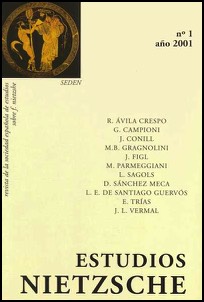¿Para qué filología? Significación filosófica de la edición Colli-Montinari de la obra de Nietzsche
DOI:
https://doi.org/10.24310/EstudiosNIETen.vi1.8838Keywords:
hermenéutica, filología, filosofía experimentalAbstract
La obra de Nietzsche posee unas características muy particulares, que la separan netamente dentro de la historia de la filosofía. Ellas plantean problemas muy complejos de interpretación. Actualmente, cualquier investigación rigurosa sobre pensamiento debe comenzar exponiendo los presupuestos metodológicos adoptados para la interpretación de su obra, justificándolos o sólo indicándolos. Es la cuestión que entre la crítica alemana, y en torno a los Nietzsche-Studien, se ha denominado, nietzscheanamente, Nietzsche-lesen: el problema de ‘aprender a leer bien’ a Nietzsche. Esta tarea tiene ante sí dos problemas hermenéuticos básicos: la división que presenta su obra en, por una parte libros publicados, y por otra fragmentos póstumos; y el carácter fragmentario de toda su obra. El presente estudio dilucidará el primer problema hermenéutico bajo un punto de vista particularmente privilegiado: discutiendo la significación, no sólo filológica, sino filosófica de la edición Colli-Montinari.
Downloads
Metrics
References
Biser, E., «Das Desiderat einer Nietzsche-Hermeneutik. Der Gang der Wirkungsgeschichte», Nietzsche-Studien, 9 (1980), 1-37
Brusotti, M., Die Leidenschaft der Erkenntnis. Philosophie und ästhetische Lebensgestaltung bei Nietzsche von Morgenröthe bis Also sprach Zarathustra, Berlin: W. de Gruyter, 1997.
Colli, G. , Scritti su Nietzsche, Milano, Adelphi, 19862.
Gilman, S.L., Nietzschean Parody. An introduction to reading Nietzsche, Bonn: Bouvier, 1976.
Heller, P., «Multiperspektiven Interpretieren. Bemerkungen zum Thema ‘Nietzsche lesen’», Nietzsche-Studien, 13 (1984), 624-642;
Howey, R.L., «Some Difficulties about reading Nietzsche», Nietzsche-Studien, 8 (1979), 378-388.
Kaulbach, F., Sprachen der ewigen Wiederkehr: die Denksituationen des Philosophen Nietzsche und ihre Sprachstile, Würzburg: Königshausen & Neumann, 1985.
Lambrellis, D.N. Nietzsche.Filósofo de la multiplicidad y de la máscara, Atenas: Dodoni, 1988.
Montinari, M., Nietzsche lesen, Berlin: W. de Gruyter, 1982.
Müller-Lauter, W., «Zwischenbilanz. Zur Wieterführung der von Montinari mitbegründeten Nietzsche-Editionen nach 1986», Nietzsche-Studien, 23 (1994), 307-316.
Nietzsche, F., Sämtliche Werke. Kritische Studienausgabe, ed. G. Colli y M.Montinari, III vol., Berlin-New York / München: W. de Gruytrer, 1980.
Nietzsche, F., Sämtliche Werke. Kritische Studienausgabe, ed. G. Colli y M.Montinari, XII vol., Berlin-New York / München: W. de Gruytrer, 1980.
Nietzsche, F., Sämtliche Werke. Kritische Studienausgabe, ed. G. Colli y M.Montinari, XIII vol., Berlin-New York / München: W. de Gruytrer, 1980.
Nietzsche, F., Sämtliche Werke. Kritische Studienausgabe, ed. G. Colli y M.Montinari, XIV vol., Berlin-New York / München: W. de Gruytrer, 1980.
Schmidt, H. J. «Mindestensbedingungen nietzscheadäqueterer Nietzsche-Interpretation oder Versuch einer produktiven Provokation», Nietzsche-Studien, 18 (1989), 440-454.
Downloads
Published
How to Cite
Issue
Section
License
As of issue 21 (2021) this journal is published only in open access (diamond route).
From that number 21, like the previous numbers published in NIETZSCHE STUDIES, they are subject to the Creative Commons Acknowledgment-NoComercia-ShareIgual 4.0 license, the full text of which can be consulted at <http://creativecommons.org/licenses/by-nc-sa/4.0 >
It is the responsibility of the authors to obtain the necessary permissions of the images that are subject to copyright.
This work is licensed under a Creative Commons Attribution-NonCommercial-ShareAlike 4.0 International License.
Copyright generates two different rights: moral rights and patrimonial rights that EJFB recognizes and respects. Moral rights are those relating to the recognition of the authorship. They are rights of a personal nature that are perpetual, inalienable, unseizable and imprescriptible as consequence of the indivisible union of the author and his/her work.
Patrimonial rights are those that can be derived from the reproduction, distribution, adaptation or communication of the work, among others.







11.png)
